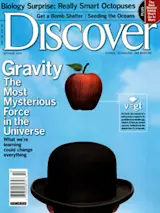A Speedway to the Stars? The research being done by NASA engineer Robert Frisbee to find a feasible method of interstellar travel ["Star Trek," August] is fascinating. I was surprised, however, at the omission of any reference to the double-edged sword of relativity. On one hand, astronauts on a vessel traveling a significant fraction of the speed of light would experience time passing much more slowly than observers back on Earth. This would make the question of preparing for a decades-long voyage unnecessary, as the astronauts might experience it as months, days, or even mere hours if they were traveling fast enough. But as the vessel approached these incredible speeds, it would progressively become heavier, requiring more thrust, or fuel, to accelerate. This added fuel would not only add mass to the vessel but also be subject itself to the relativistic increase. The amount of fuel required to gain even ...
Letters
Explore the challenges of interstellar travel and relativistic effects as NASA engineer Robert Frisbee faces the limits of speed and fuel.
More on Discover
Stay Curious
SubscribeTo The Magazine
Save up to 40% off the cover price when you subscribe to Discover magazine.
Subscribe













